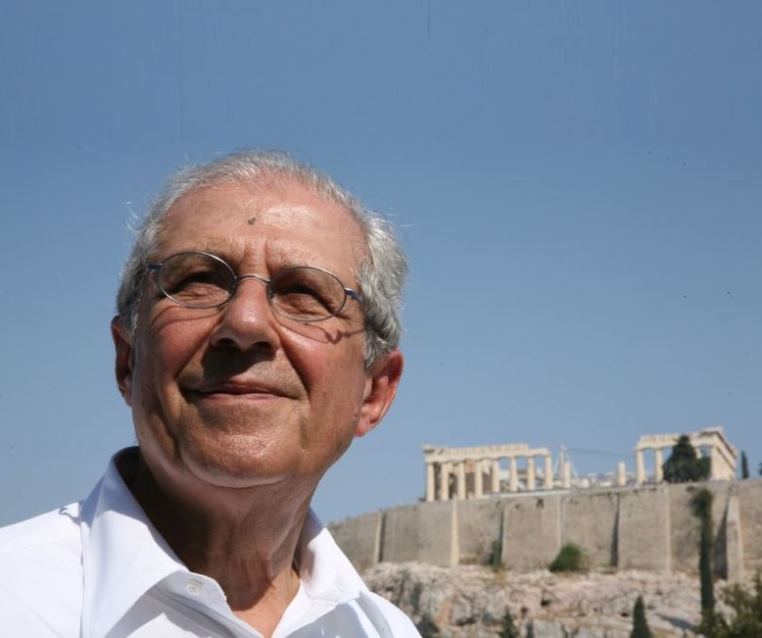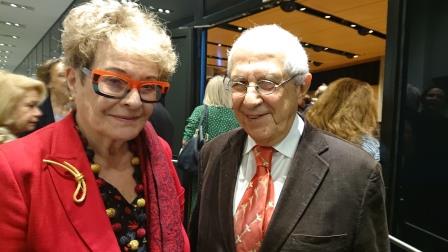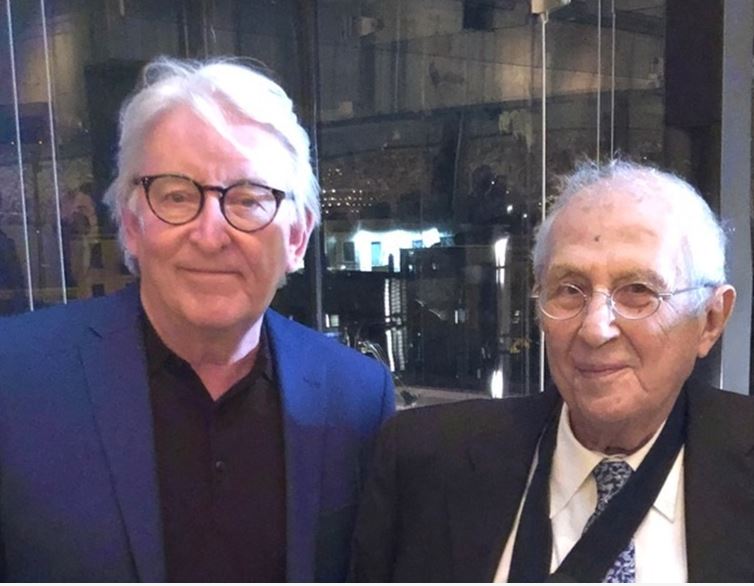
The President of the Acropolis Museum, Professor Dimitrios Pandermalis, sadly passed away on Wednesday 14 September 2022
Dimitris Pandermalis was admired and liked by many people, but his special gift to the British Committee for the Reunification of the Parthenon Marbles was in overseeing the creation of what has become the strongest of all the arguments for our case, the New Acropolis Museum. Not only was he its President, for more than a decade from its opening in 2009 but, for years before that, his achievement was almost as great as he pressed for the project, at times amid defeatist rumours and changes of Government. When the Marbles are finally reunited, his name should stand very high in the list of those credited for this act.
Professor Anthony Snodgrass, Honorary President, BCRPM
I only met Professor Pandermalis properly when we were in Athens, in April 2019 and thought him one of the most delightful and certainly one of the most knowledgeable gentlemen I had ever had the pleasure of meeting. I realised that the great Acropolis Museum was in perfectly wonderful hands, and I am most upset to hear he has gone as his presence there was very special. His fine guardianship will be continued of that there is no doubt, but his personality, his gentleness and great scholarship, will be missed. I send my condolences to his family and my sad greetings to the staff of the Museum which so flourished under his command. Floreat!
Janet Suzman DBE, Chair, BCRPM

I was honoured and privileged to count Professor Dimitris Pandermalis as not only a brilliant colleague (a superb archaeologist, especially known for his Dion excavations and site display, as well as outstanding Museum director) but also a friend - as well of course as a comrade-in-arms for the reunification of all the Parthenon Marbles/Sculptures where they rightfully belong. In my short address at the recent 'Parthenon and Democracy' conference, held shortly after his sudden and very sad death and held in the Auditorium of the Acropolis Museum that now, happily, bears his name, I called him a προμαχοσ, 'champion' (one of goddess Athene's most prominent titles), both of the Acropolis and of its Museum.
As a friend, he was also persuaded - by Annie Ragia of the excellent Melissa publishing house - to write a graceful and informative foreword specially for the Greek translation of my Archaic Greece: A Very Short Introduction (Oxford University Press 2009, revised edition 2011). It was due to him surely too that the artwork for that beautifully presented edition was the handiwork, the craftsmanship, of the peerless Prof. Manolis Korres, architect of the Parthenon restoration. Dimitris will always be in my thoughts, as he will be in those of all of us, not least those of us of the BCRPM and IARPS, who cherish the goal of Parthenon Marbles/Sculptures reunification.
Professor Paul Cartledge (Vice-Chair, BCRPM, Vice-President IARPS, Commander Ταξιαρχησ of the Order of Honour (Greece), and Honorary Citizen of Sparti Επίτιμος Δημότης Σπαρτιατών)
When the new Acropolis Museum was being built, I ventured to go up to the barrier and ask if I and my friend could see round. To my amazement a young woman came out and took us on a tour of the nearly completed structure. On learning of my particular interest, she informed Professor Pandermalis, who also came to talk to us, gave us a broken fragment of the white marble being used to wrap the new museum in its glorious coat and invited us to return once it was functioning. This extraordinarily warm welcome was repeated whenever we went back to Athens and Dimitri Pandermalis extended its embrace to the entire building, making it one of the most loved, best visited and deeply appreciated of all modern museums. What an extraordinary capacity to inspire, to create and to secure this great achievement! How deeply he is missed, and will be forever remembered.
All my thoughts with his family and colleagues,
Professor Judith Herrin, member of BCRPM
Duff Cooper Pol Roger Prize 2020 for Ravenna. Capital of Empire, Crucible of Europe
Heineken Prize for History 2016
Constantine Leventis Senior Research Fellow, Department of Classics, King's College London
Most of my friends and colleagues know me as a philhellene, so whenever any of them visits Athens for work or holiday, I get a text asking for recommendations. I always reply with express instructions, whatever else they do, to visit the Acropolis Museum.
The Museum is now rightly recognised as one of the world’s greats, inside and out. Although such institutions are the vision of huge teams of people, Prof Pandermalis deserves his share of credit for that global statement at the foot of the Acropolis.
I hope the museum, its staff, and its curation remain a testament to his life’s work and his love of Greece’s sumptuous past. Να ζήσουμε να τον θυμόμαστε.
Stuart O’Hara, BCRPM member
I was very saddened to hear of the death of Professor Pandermalis, whom I had the great pleasure to meet on a number of occasions over the years and who always welcomed me most warmly to the Acropolis Museum whenever I visited. I met him for the last time earlier this year when I was kindly invited by the Marianna V. Vardinoyannis Foundation to give the keynote speech at the Acropolis Museum in honour of International Womens Day. I knew almost nobody else at the function, but when, on his arrival, he spotted me across the Parthenon Gallery, he approached with a beaming smile and said, “Ah, welcome Doctor Flynn!” I confess I fought back the tears. Not only was I impressed that he remembered me, but I could also immediately sense that he had grown quite frail since our last meeting some years ago. Nevertheless he approached the rostrum and delivered a moving introductory welcome to the symposium and I realised then what a rock he has represented for so many of us for so long. His deep knowledge, quiet diplomacy and good grace will be sadly missed by everyone involved in the campaign to reunify the Marbles in Athens.
Dr Tom Flynn FRSA, Art Provenance Research & friend of BCRPM

Tom with Dimitrios at the Acropolis Museum, 08 March 2022
I can only echo Tom’s reflections on Professor Pandermalis, his irreplaceable loss to Greek archaeology and his towering contribution to the case for reuniting the Parthenon sculptures, made unanswerable through the building of the Acropolis Museum.
I met Professor Pandermalis for the first time at the UNESCO Conference on cultural restitution held in Athens in 2008. The new Museum, which he masterminded, was nearing completion, and delegates were treated to a guided tour by the great man. I was struck by the quiet dignity and authority of Professor Pandermalis, and as an Englishman, I was embarrassed by and ashamed of the gaps in the narrative sequence of Parthenon sculptures resulting from their removal by Elgin and their continued exhibition in London.
The very existence of that superb Museum, with its monumental top floor, a ‘vitrine’ to exhibit Phideas’ masterpieces in line of sight of the Parthenon under an Athenean sky, was a master stroke. It made the position to oppose the reunification of the sculptures an entirely untenable one.
Though we will miss him, Pandermalis’ legacy will long be celebrated and will one day bear the fruit that he – and we – so devoutly desired.
Tristram Besterman,one time Director of The Manchester Museum and Chair of the Museums Association Ethics Committee, writer on museum ethics and facilitator for the repatriation of misappropriated material culture from UK museums. Long time influencer to BCRPM!
Professor Pandermalis and Eddie had great respect and regard for each other. They worked tirelessly together with Eleni and you, Marlen. Please pass my sympathy and very best wishes to his family for their loss and his colleagues at the museum. He leaves a wonderful legacy as we treasure the last time we travelled to Athens and met with him in 2014, a treasured memory that I hold dear to my heart at this sad time.
Margaret O’Hara (widow of past Chair of BCRPM, politician Eddie O’Hara)
Over the long years Professor Pandermalis was the driving force behind the creation of the magnificent [New] Acropolis Museum, I had the honour to work with him for the presentation of the plans, the progress of the works and, finally, the museum itself in a number of events in London, mainly at Senate House, the RIBA and the ICA. Even during the difficult times when the very construction of the Museum was uncertain, collaborating with him was always a source of inspiration and joy. His wry sense of humour and his pragmatic outlook helped resolve impasses, find creative solutions and move the project forward despite and against all odds.
His vision for the Museum remained clear throughout this difficult, lengthy process. One of his first concerns long before construction began was the creation of the Museum gardens and I remember long discussions over the plants to be chosen, their exact position etc. My personal abiding memory is the touching way with which he cared for a tiny olive tree I offered for the gardens at a particularly difficult moment of the design process, when it was not certain that the building would go ahead as planned. He kept it in his office for a long time and only had it planted in July 2008, just after the building work was completed. What I did not know when he took me to see it was that he had chosen the spot so that he could see the tree grow from his office window. I only found this out years later, from the Museum guard that helped Professor Pandermalis plant it.
It is heartening to think that he is now in a better place, in the company of Eleni, Eddie and Robert Browning. I am sure they are looking down at us, urging us to continue the quest.
Dr Victoria Solomonidis-Hunter FKC
Member, Governing Body, Melina Mercouri Foundation

Visiting Athens with Eleni from early on, over 23 years ago, and subsequently before, and after the museum opened, all meetings with Professor Pandermalis were a highlight. The camaraderie between Eleni and Dimitris was infectious. I also have him to thank for introducing me to bergamot spoon sweet, something I then became addicted to! But the real highlight was presenting to the British Guild of Travel Writers, which in turn gave the museum an award, presented here at the Savoy in London, twelve years ago. I will always be thankful that Professor Pandermalis was happy to talk to UK journalist, showing them around that magnificent top floor, which dismisses any arguments the British Museum, may try to use to continue to uphold this ludicrous division of a peerless collection of sculptures from the Parthenon. And, lastly for being thoughtful when Eleni passed away in April 2020 and agreeing that an olive tree might be planted for her and James Cubitt as the founders of BCRPM. Something we have yet to do but am sure that when we do, Professor Pandermalis will be watching with Eleni, James, Eddie, George & William ! We will remember him with huge fondness, and send our heartfelt condolences to his family and all of his colleagues at the museum.
Marlen Taffarello Godwin, member & Secretary of BCRPM